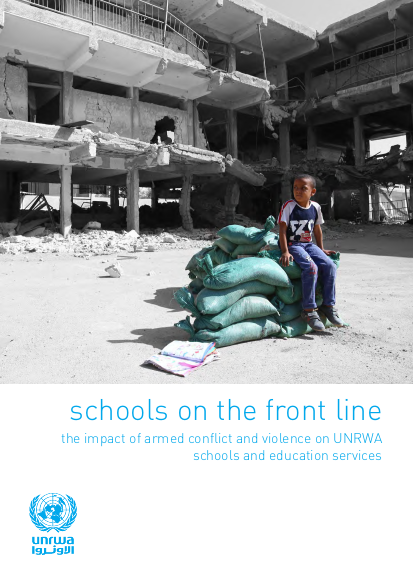
It is estimated that nearly 24 million children living in conflict zones around the world are out of school. The United Nations Relief and Works Agency for Palestine Refugees in the Near East (UNRWA) operates 692 elementary and preparatory schools in the Gaza Strip, Jordan, Lebanon, Syria and the West Bank, including East Jerusalem, as well as eight secondary schools in Lebanon, providing free basic education for around half a million Palestine refugee children. Yet many UNRWA schools are on the front line of armed conflict and violence, which has endangered the lives of Palestine refugee children and posed serious challenges to providing for their education. UNRWA estimates that, in the last five years, 302 (or 44 per cent) of all its schools have been directly impacted by armed conflict and violence, either causing physical damage to the schools or significantly disrupting education services.
Even in emergency situations, quality education helps provide physical and psychosocial protection that can sustain and save lives, while providing a sense of routine, stability, structure and hope. Innovative education services can also enable students to continue learning even in times of crisis.
This report documents the impact of armed conflict and violence in recent years on UNRWA schools and the education services provide by the Agency. In Syria, five years of conflict have rendered over 70 per cent of UNRWA schools inoperative, due to damage to school infrastructure, access restrictions or the need for schools to be used as collective centres sheltering internally displaced persons (IDPs). In Gaza, the Israeli-imposed blockade and repeated hostilities have had a devastating impact on Palestine refugee children. During the hostilities that took place during the summer of 2014, six UNRWA school buildings used as designated emergency shelters for IDPs were hit directly or indirectly, causing deaths and/or injuries, and at least 83 school buildings were damaged.
In the West Bank, including East Jerusalem, nearly 50 years of military occupation has hindered the education and development of children and youth – even more so with the upsurge in violence since October 2015. In Lebanon, Palestine refugee camps have been marked by clashes and UNRWA schools have been physically damaged and exposed to instances where schools were used by armed factions.
Importantly, this report also provides an overview of UNRWA’s response to addressing such challenges, including efforts to continue to deliver education services to thousands of Palestine refugee children, even in such adverse conditions. This includes ensuring Palestine refugee children can continue learning through selflearning materials and safe learning spaces, addressing the psychosocial needs of children, rebuilding and repairing damaged schools, and advocating to prevent, and seek accountability for, attacks against UNRWA schools and ensure that their inviolability under international law is respected. Finally, the report presents a set of recommendations to relevant actors.
